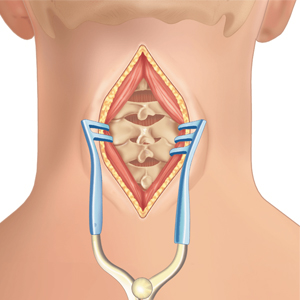What You Need to Know About Neck Surgery
The Neck region is a very important part of our body because many vital structures are situated in the neck
The following are conditions that require surgical intervention in the neck :
- Thyroid Abnormality
- Cervical lymph node enlargement
- Neck Malignancies
- Esophageal Surgery
- Tracheostomy
Thyroidectomy
Thyroid surgery known as Thyroidectomy is the surgical extraction of all or part of your thyroid gland. Your thyroid is a butterfly-shaped gland found at the base of your neck. It generates hormones that regulate every aspect of your metabolism, from your heart rate to how swiftly you burn calories.
Your doctor may advise a thyroidectomy if you have diseases such as:
- Thyroid cancer.
- Noncancerous enlargement of the thyroid (goiter).
- Overactive thyroid (hyperthyroidism).
- Indeterminate or suspicious thyroid nodules.
A Thyroidectomy is traditionally a minimally invasive surgery conducted through a small horizontal cut in the front of the neck. The complete thyroid gland may be removed or just a single lobe, a part of a lobe, and the isthmus or other structures. Depending on the extent of the surgery, patients may need to take the drug levothyroxine, an oral synthetic thyroid hormone.

There is no reason to change your diet and/or most medications before your surgery. You will be consulted by the anesthesiologist at least one week before your surgery for a preoperative check. At this appointment, there may be blood or other tests done to prepare you for your surgery. If you take blood-thinning medications, such as aspirin, Plavix, ibuprofen, or Coumadin, you will need to contact the prescribing physician to consider stopping these medicines before your surgery.
Most patients only stay one night in the hospital.
The cut is about 1-2 inches in length and is placed in the midline of the neck in a normal skin crease to reduce scarring and visibility.
Resume a normal well-balanced diet as tolerated. Be certain to drink plenty of fluids.
In general, you can return to work whenever you feel ready. Surgeons usually ask patients to take rest for one to two weeks.
